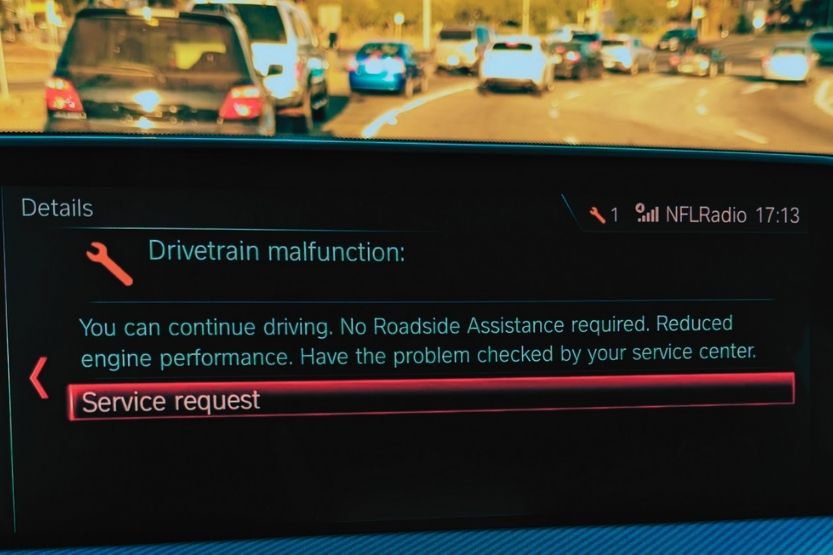A BMW has an advanced and intelligent system that will warn you of any problem. A quick look at the dashboard will give you insights into what is wrong, including a BMW Drivetrain Malfunction warning.
Here are the leading causes of BMW drivetrain malfunction:
- Old spark plugs
- Ignition coil failure
- Fuel pump malfunction
- Catalytic converter damage
- Transmission fluid leak
- Old differential fluid
- CV joint issue
- Poor fuel quality
- Timing chain breakage
- Bad fuel injector
When you experience a BMW drivetrain malfunction, one of the first things to do is reset it. You can restart the engine, check under the engine for damages, and use an OBD II scanner to dig deeper into the problem.
Act immediately when there is a drivetrain malfunction. A professional repair can cost $2,068 to $2,108, depending on the extent of the problem.
Read on to learn more about BMW Drivetrain Malfunction, including its causes and solutions. We’ll also talk about repair costs and everything else you need to know.
BMW Drivetrain Malfunction Causes

A problem with the BMW drivetrain is often a result of issues with its different components, including the following:
1. Old Spark Plugs
A Circuit with an Arc That Produces Sparks
The spark plug is a circuit with an arc that produces sparks. It raises the voltage, causing the electricity to jump. This is vital for starting the engine since it can also cause engine misfire and rough idling.
Inefficient When Old
In old BMWs that display the Drivetrain Malfunction message, one of the most common causes is an aging spark plug. Once they are past their prime, the spark plugs become inefficient, triggering a warning message.
Replace Spark Plugs for Peak Performance
Once the engine detects damage in the spark plug, it will automatically shut down. This will prevent more serious and expensive damage. If you keep on driving, it can cause irreparable damage. So, make sure to replace spark plugs to keep them working at their peak.
2. Ignition Coil Failure
Sends the Power for the Spark Plugs to Work
The ignition coil is a crucial component that sends the necessary power for the spark plugs to work. It is crucial for the proper engine combustion timing. Without proper timing, your BMW will experience a cylinder misfire. In turn, it can damage the engine and hurt the overall performance.
Exposure to Heat and Vibration
A common cause of BMW x3 drivetrain malfunction is that the ignition coil starts failing due to exposure to extreme heat and vibration. On average, it has a lifespan of 140,000 miles.
Replace After 20,000 to 25,000 Miles for the Best Performance
Nonetheless, if you often push your vehicle to the limit, the lifespan decreases. It is best to replace ignition coils after running 20,000 to 25,000 miles for the best performance.
Engine Stalling
Unsure if it is the ignition coil you should blame? Watch out for other symptoms. For instance, you can also experience a power loss. Another common sign is engine stalling. Additionally, fuel economy can suffer.
3. Fuel Pump Malfunction
Transfers Fuel from Fuel Injectors to the Gas Tank
The fuel pump is one electronic component that ensures peak performance since it transfers fuel from fuel injectors to the gas tank. It uses ignition and pressure to perform its functions.
Presence of Fuel Contaminants
As soon as you see a BMW x5 drivetrain malfunction warning, the fuel pump is one of the first things to look at. It can fail because of many reasons, including low fuel. It can also be because of fuel contaminants, causing the pump to malfunction.
The fuel pump condition can deteriorate over time, contributing to its failure. It results in sputtering during acceleration. It experiences a sudden surge upon pressing the BMW’s gas pedal.
4. Catalytic Converter Damage
Ensures the Peak Performance of the Exhaust and Emission Systems
The catalytic converter is a critical component to ensure the peak performance of the exhaust and emission systems in a BMW. It minimizes pollution and lessens exhaust smell. More importantly, its use is federally mandated, so you must follow the rules or get in trouble.
Clogged Catalytic Converter
Over time, the catalytic converter becomes clogged, and this is when it shows signs of damage. The leftovers of the exhaust gases will prevent the catalytic converter from doing its job. This is a more persistent problem in older and high-mileage models.
Affects Fuel Economy and Engine Performance
This cause of BMW 528i drivetrain malfunction can result in more problems if you do not address it properly. It will prevent your engine from working efficiently. Aside from poor engine performance, fuel economy also suffers.
5. Transmission Fuel Leak
Cools and Lubricates the Vehicle’s Transmission
If you are looking for the causes of the BMW F30 drivetrain malfunction, another thing that is worth looking at is the transmission fluid. It cools and lubricates your vehicle’s transmission. Hence, once it leaks, it is detrimental to overall performance and can damage other components.
Check Using the Dipstick
Checking using the dipstick is one of the easiest ways to determine if the transmission fluid is leaking. The fluid in the dipstick should be pink or clear. If it is brownish, it needs a replacement.
At the same time, when the dipstick shows that it is low, it is a sign that it is leaking, and hence, you will need a refill.
Strange Sounds and Gears Grinding
Your BMW can also make weird sounds when the transmission is leaking. One of the most common is the grinding of the gears. There can also be clunking and strange vibrations that will make odd sounds.
6. Old Differential Fluid
Lubricates the Differential Gears
A BMW uses different fluids to ensure its peak performance. Among others, one of the most important is differential fluid. It lubricates the differential gears to reduce friction and reduce heat, resulting in better performance and efficiency.
Less Effective Due to Exposure to Heat and Contaminants
Like other fluids in a car, differential fluids break down over time. The exposure to heat and contaminants will make it less effective. It can be one of the leading causes of BMW i3 drivetrain malfunction as it wears.
Change the Differential Fluid After Running 20,000 to 50,000 Miles
The best solution is to replace the differential fluid regularly, depending on the manufacturer’s recommendations, to prevent this problem. To keep the differential of your BMW running at its peak, change the differential fluid after running 20,000 to 50,000 miles.
7. CV Joint Issue
One of the Most Important Drivetrain Parts
As mentioned earlier, the CV joint is one of the most important drivetrain parts. Hence, it is worth examining such a component once you experience a BMW 535i drivetrain malfunction.
Connects the Transmission to the Drive Wheels
In a BMW, the CV joint is a component of the axle assembly. It connects the transmission to the drive wheels. Once it encounters a problem, the link between the two important parts breaks. When such happens, the Drivetrain Malfunction message will appear on your dashboard.
Odd Sounds
Aside from the warning on the screen, another way to diagnose a problem in the CV joint is to listen as you drive. The breakage of this component will compromise the functions of the parts that attach to it, resulting in odd sounds.
8. Poor Fuel Quality
BMWs are known for being premium vehicles. Hence, they deserve the best-quality fuel. Otherwise, you will end up compromising its performance. It can cause a slew of problems, including drivetrain malfunction.
Use Fuel with At Least a 93-octane Rating
If you are using low-octane fuel in your BMW, it is one of many potential drivetrain malfunction causes worth looking at. We recommend using only fuel with at least a 93-octane rating to prevent this problem.
Opt to Use an Octane Booster
Those who cannot access fuels with a high-octane rating can instead opt to use an octane booster. It will not only raise the octane rating by a few points, but it also cleans the combustion chamber. To add, it prevents engine ping and knocks.
9. Timing Chain Breakage
Ensure the Synchronous Movement of the Crankshaft and Camshaft
The main function of the timing chain is to ensure the synchronous movement of the crankshaft and camshaft. As a result, the engine’s valves will open and close at the right time.
Requires Proper Lubrication
The timing chain requires proper lubrication to maintain its peak performance. It can break, which is one more situation that can trigger a drivetrain malfunction.
Rough Idling
Aside from the warning in your dashboard, a failing timing chain exhibits after symptoms. One of the most common is rough idling, making your car shake or vibrate. It is also common to find metal shaving in oil. The Check Engine Light can also turn on.
10. Bad Fuel Injector
Vehicle’s Power Is Reduced
A clog or damage in the fuel injector is another potential culprit for drivetrain malfunction. When such happens, your vehicle’s power reduces significantly, hurting its overall performance. The effects are more evident when you are in challenging environments.
Engine Misfire or Sputter
The symptoms of a bad fuel injector can be similar to many of the issues mentioned above. It can cause the engine to misfire or sputter. Rough idling is also common. Additionally, your gas mileage will tank.
Replace After 50,000 to 100,000 Miles
To ensure the peak functionality of your fuel injectors, you must replace them all simultaneously. It will result in better consistency. While most fuel injectors can last as long as the vehicle, you must change it after 50,000 to 100,000 miles in real-world situations.
Again, what are the BMW Drivetrain malfunction causes? One of the reasons for a BMW drivetrain malfunction is insufficient fuel pressure from the fuel pump. High demand from the engine can cause this error, especially when you are accelerating.
How to Reset BMW Drivetrain Malfunction

Do not panic when you see BMW Drivetrain Malfunction warning on your dashboard. Below is a quick step-by-step guide on how to reset it:
1. Restart the Engine
As soon as the warning shows up, turn the engine off and restart. If you are on the road, find a safe spot where you can pull over and diagnose the problem. Turn your vehicle’s ignition and take the key out. Let the engine rest for at least five minutes. Restart the engine.
In most instances, this will lead to a BMW drivetrain malfunction reset. If not, move to the next steps, as you will probably have to deal with a more serious issue.
2. Check the Engine
If the problem persists, you need to look under the hood. Pull the hood release lever, which you will find under the dashboard. Step outside and pop the hood open. Before doing this, make sure that the engine has cooled down and park where you won’t disturb others on the road.
As you check the engine, look for anything unusual. It may have damaged parts that are responsible for the drivetrain malfunction. You must also look for any signs of leaks of fluids or oils.
3. Use a Scanner to Diagnose the Problem
At this point, if you cannot still identify the root cause of the problem, use an OBD II scanner. This handy tool will show various error codes to determine what is wrong with the BMW drivetrain.
Look for the OBD II scanner port in the dashboard and plug in the device. Turn the ignition on, but you should not start the engine. Turn on the OBD II scanner and choose BMW code. Read the code and consult the manual to know what it means. Act accordingly depending on the problem.
How Much Does It Cost to Repair a BMW Drivetrain
While some people might attempt to fix a BMW drivetrain malfunction on their own, we suggest letting the pros do it. It is worth every dollar because of their experience and knowledge.
You can be more confident that they will address the root cause. If you do it yourself, you might make the issue worse.
The specific BMW drivetrain malfunction repair cost depends on many things, such as the model of your vehicle, location, and the mechanic doing the job.
On average, the cost is anywhere from $2,068 to $2,108. The part itself can be as much as $1,913. On the other hand, the cost of labor can range from $155 to $195.
What Is a BMW Drivetrain?
The drivetrain may be small, but it is an integral part of a BMW and other car brands. Many people often misunderstand it. It is often also confused with driveline and powertrain, which are both different components.
A drivetrain is a collection of different components vital to a BMW’s performance. It transfers power from the transmission to the wheels, allowing it to move forward. In a typical setup, below are the most common parts of a BMW drivetrain:
1. Driveshaft
This long steel tube connects the transmission and the wheels. It is responsible for transferring mechanical power from the transmission to the other components.
2. Transmission
It will allow the driver to shift gears depending on what a specific situation calls for. The transmission transfers an engine’s power to the wheels.
3. CV Joint
The main function of the constant velocity joint allows the movement of the axle upon turning the drive wheels.
4. U-Joint
Also called a universal joint, this is the driveshaft’s flexible point, which will let the shaft pivot as you encounter rough spots.
5. Differential
It is the housing with the axle gears. It is the last stop of the power transfer before it goes to the wheels.
Frequently Asked Questions

What Is the Difference Between a BMW Drivetrain and a Powertrain?
Drivetrain and powertrain are two terms that many people use interchangeably. While they have similarities, note that they do not have the same functions. The drivetrain is a set of car components, including the following:
- Driveshaft,
- Transmission,
- U-joint,
- CV joint, and
- Differential.
Meanwhile, a powertrain has all the drivetrain parts, but it includes one more thing – the engine. It is a part of the moving elements that allow the powertrain to deliver its intended functions.
Can I Drive with a BMW Drivetrain Malfunction?
If you are experiencing a BMW drivetrain malfunction when accelerating or driving, do not continue. It is best to pull over immediately and inspect the car.
If you are unsure, call a mechanic or the dealership. Ignoring the problem will make it costlier to repair, but it can also compromise the vehicle’s performance and safety.
How Can I Maintain the BMW Drivetrain?
The drivetrain has different components, so the specific care and maintenance will depend on the individual parts. In most cases, it will require regular cleaning.
The accumulation of dirt and debris can put too much strain on the moving components. Regular changing of oils and fluids is also necessary to reduce friction and improve efficiency.
Is the Drivetrain the Same as the Transmission in BMW?
No, a BMW drivetrain is not the same as a transmission. The drivetrain is a collective term that refers to the different parts that allow the movement of the wheels after transferring power from the engine. The transmission is one of the parts of the drivetrain.
Conclusion – BMW Drivetrain Malfunction [Causes, Reset, and Repair Cost]
The BMW drivetrain malfunction is a serious problem that requires immediate attention. When there is an issue, reset the drivetrain immediately. You can do so by restarting the engine.
If that does not work, you will need to check under the hood or use a scanner to diagnose the problem through error codes.
Clueless about why the BMW drivetrain is experiencing problems. Below is a quick list of the potential culprits:
- Old spark plugs
- Ignition coil failure
- Fuel pump malfunction
- Catalytic converter damage
- Transmission fluid leak
- Old differential fluid
- CV joint issue
- Poor fuel quality
- Timing chain breakage
- Bad fuel injector
Read next:


![Malfunction Indicator Lamp [What Does It Mean?] malfunction indicator lamp](https://roadsumo.com/wp-content/uploads/2022/04/malfunction-indicator-lamp-150x150.jpg)
![How Much Does Paintless Dent Repair Cost? [Full Guide] how much does paintless dent repair cost](https://roadsumo.com/wp-content/uploads/2022/05/how-much-does-paintless-dent-repair-cost-150x150.jpg)
![Scratched Rims Repair Cost [How Much to Fix a Scratched Rim?] Scratched Rims Repair Cost](https://roadsumo.com/wp-content/uploads/2021/10/scratched-rims-repair-cost-150x150.jpg)



![Read more about the article 3057 vs 3157 [Difference Between 3057 and 3157 Bulbs]](https://roadsumo.com/wp-content/uploads/2020/10/3157-vs-3057-300x200.jpg)
![Read more about the article P0440 Code [Causes and How to Fix]](https://roadsumo.com/wp-content/uploads/2021/03/P0440-300x200.jpg)